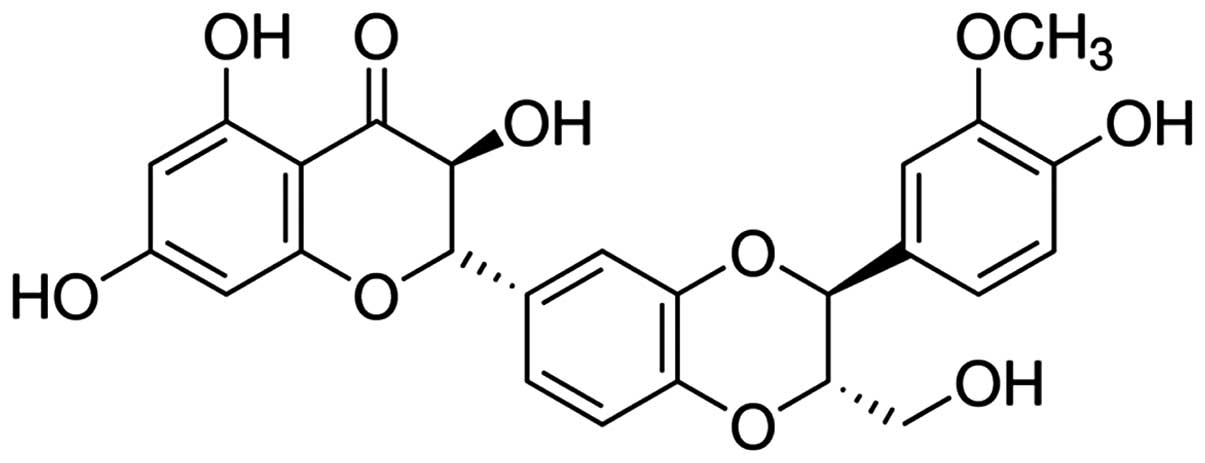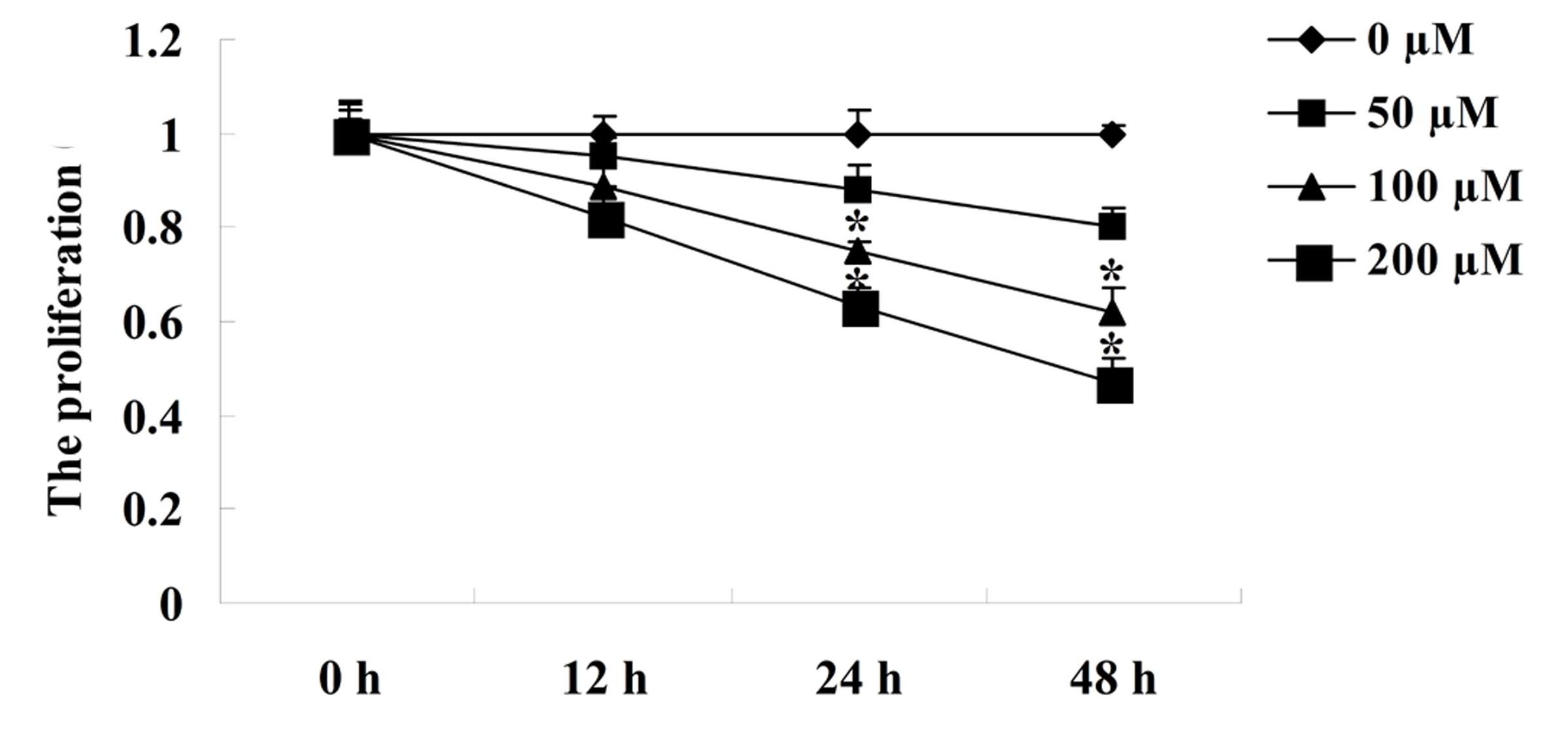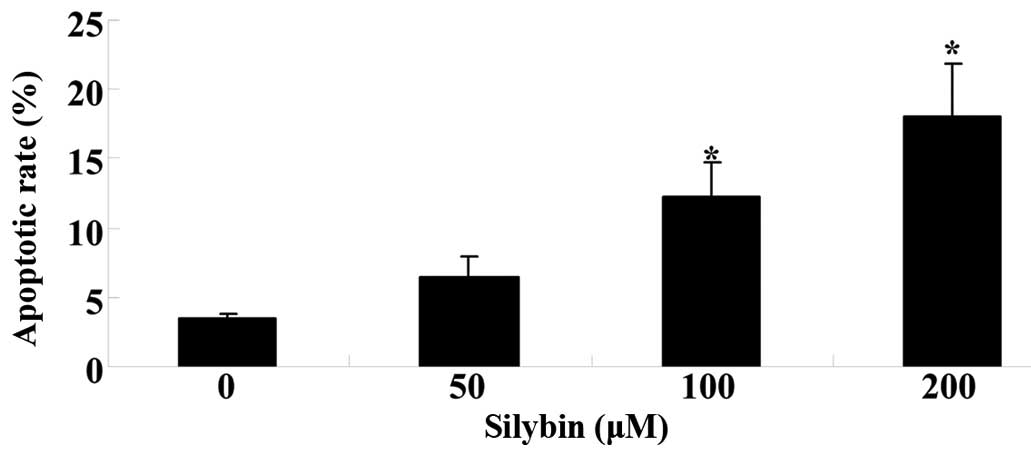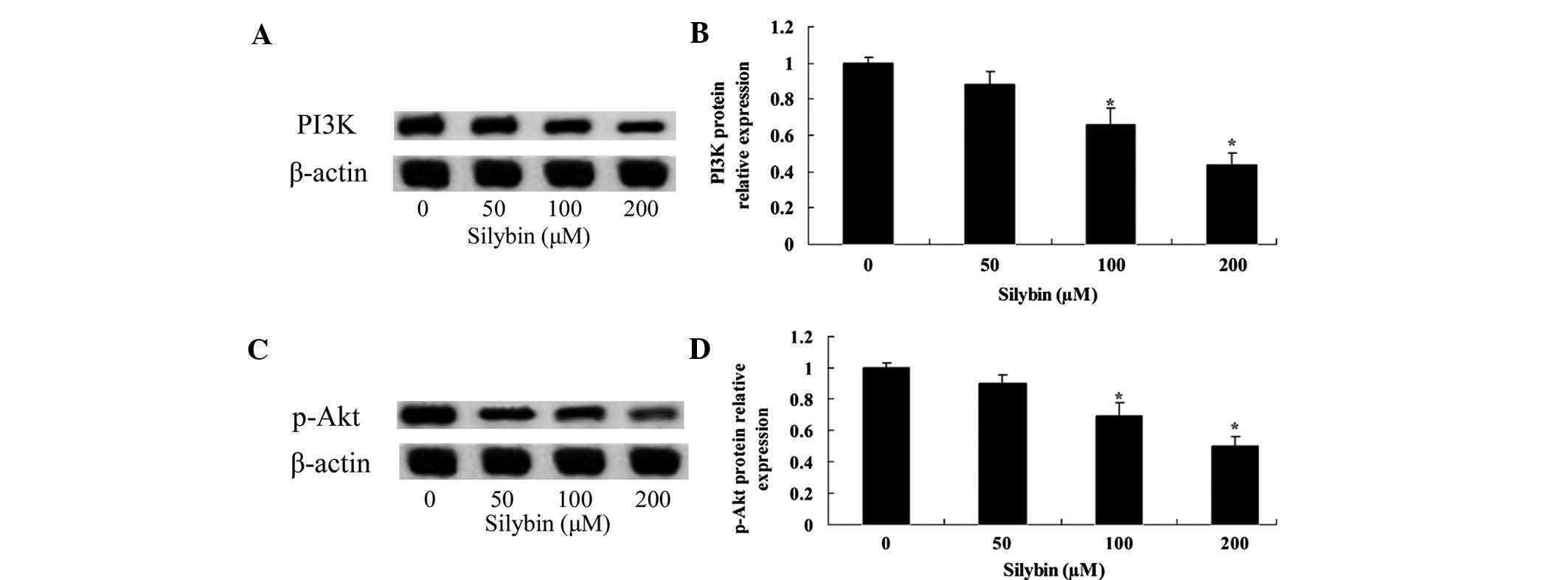|
1
|
García-Escobar I, Parrilla L, Ortega LM,
Castellanos D, Pallarés MA and Cortés-Funés H: Clinical experience
with plerixafor as a mobilization regimen for autologous peripheral
blood stem cell transplantation in patients with refractory germ
cell tumors. Mol Clin Oncol. 2:923–926. 2014.PubMed/NCBI
|
|
2
|
Yang G, Geng C, Li Y, Liu A and Chen W:
Multiple myeloma with extramedullary plasmacytoma invading the skin
and eyeballs following autologous stem cell transplantation: A case
report. Exp Ther Med. 6:883–886. 2013.PubMed/NCBI
|
|
3
|
Yang LJ, Chen Y, He J, Yi S, Wen L, Zhao S
and Cui GH: Effects of gambogic acid on the activation of caspase-3
and downregulation of SIRT1 in RPMI-8226 multiple myeloma cells via
the accumulation of ROS. Oncol Lett. 3:1159–1165. 2012.PubMed/NCBI
|
|
4
|
Kwon SJ, Lee JH, Moon KD, Jeong IY, Yee
ST, Lee MK and Seo KI: Isoegomaketone induces apoptosis in SK-MEL-2
human melanoma cells through mitochondrial apoptotic pathway via
activating the PI3K/Akt pathway. Int J Oncol. 45:1969–1976.
2014.PubMed/NCBI
|
|
5
|
Yang Y, Zhou X, Xiao M, Hong Z, Gong Q,
Jiang L and Zhou J: Discovery of chrysoeriol, a PI3K-akt-mTOR
pathway inhibitor with potent antitumor activity against human
multiple myeloma cells in vitro. J Huazhong Univ Sci Technolog Med
Sci. 30:734–740. 2010. View Article : Google Scholar : PubMed/NCBI
|
|
6
|
Agarwal C, Wadhwa R, Deep G, Biedermann D,
Gažák R, Křen V and Agarwal R: Anti-cancer efficacy of silybin
derivatives-a structure-activity relationship. PLoS One.
8:e600742013. View Article : Google Scholar
|
|
7
|
Tan C, Xu X, Shang Y, Fu X, Xia G and Yang
H: A novel approach for the efficient extraction of silybin from
milk thistle fruits. Pharmacogn Mag. 10:536–540. 2014. View Article : Google Scholar : PubMed/NCBI
|
|
8
|
Gándara L, Sandes E, Di Venosa G, Prack
McCormick B, Rodriguez L, Mamone L, Batlle A, Eiján AM and Casas A:
The natural flavonoid silybin improves the response to photodynamic
therapy of bladder cancer cells. J Photochem Photobiol B.
133:55–64. 2014. View Article : Google Scholar : PubMed/NCBI
|
|
9
|
Mahmoodi N, Motamed N and Paylakhi SH: The
comparison of the effects of silybin and
silybin-phosphatidylcholine on viability and ESR expression in
human breast cancer T47D cell line. Cell. J16:299–308. 2014.
|
|
10
|
Zhang S, Yang Y, Liang Z, Duan W, Yang J,
Yan J, Wang N, Feng W, Ding M, Nie Y and Jin Z: Silybin-mediated
inhibition of notch signaling exerts antitumor activity in human
hepatocellular carcinoma cells. PLoS One. 8:e836992013. View Article : Google Scholar
|
|
11
|
Rui M, Huang Z, Liu Y, Wang Z, Liu R, Fu J
and Huang H: Rosiglitazone suppresses angiogenesis in multiple
myeloma via downregulation of hypoxia-inducible factor-1α and
insulin-like growth factor-1 mRNA expression. Mol Med Rep.
10:2137–2143. 2014.PubMed/NCBI
|
|
12
|
Lin M, Zhu J, Shen H and Huang J:
Gastrointestinal bleeding as an initial manifestation in
asymptomatic multiple myeloma: A case report and review of the
literature. Oncol Lett. 5:218–220. 2013.
|
|
13
|
Kabir AL, Rahman MJ, Begum M, Dipta TF,
Baqui MN, Aziz A, Rahman F, Debnath RC and Habib MA: Response of
vincristine, melphalan, cyclophosphamide and prednisolone in
refractory multiple myeloma. Mymensingh Med J. 21:114–119.
2012.PubMed/NCBI
|
|
14
|
Siegel AB, Narayan R, Rodriguez R, Goyal
A, Jacobson JS, Kelly K, Ladas E, Lunghofer PJ, Hansen RJ,
Gustafson DL, et al: A phase I dose-finding study of silybin
phosphatidylcholine (milk thistle) in patients with advanced
hepatocellular carcinoma. Integr Cancer Ther. 13:46–53. 2014.
View Article : Google Scholar
|
|
15
|
Wang L, Wu J, Lu J, Ma R, Sun D and Tang
J: Regulation of the cell cycle and PI3K/akt/mTOR signaling pathway
by tanshinone I in human breast cancer cell lines. Mol Med Rep.
11:931–939. 2015.
|
|
16
|
Wang W, Ren F, Wu Q, Jiang D, Li H and Shi
H: MicroRNA-497 suppresses angiogenesis by targeting vascular
endothelial growth factor A through the PI3K/AKT and MAPK/ERK
pathways in ovarian cancer. Oncol Rep. 32:2127–2133.
2014.PubMed/NCBI
|
|
17
|
García-Maceira P and Mateo J: Silibinin
inhibits hypoxia-inducible factor-1alpha and mTOR/p70S6K/4E-BP1
signalling pathway in human cervical and hepatoma cancer cells:
Implications for anticancer therapy. Oncogene. 28:313–324. 2009.
View Article : Google Scholar
|
|
18
|
Zhang Y, Hai J, Cao M, Zhang Y, Pei S,
Wang J and Zhang Q: Silibinin ameliorates steatosis and insulin
resistance during non-alcoholic fatty liver disease development
partly through targeting IRS-1/PI3K/akt pathway. Int
Immunopharmacol. 17:714–720. 2013. View Article : Google Scholar : PubMed/NCBI
|
|
19
|
Gong G, Hu L, Liu Y, Bai S, Dai X, Yin L,
Sun Y, Wang X and Hou L: Upregulation of HIF-1α protein induces
mitochondrial autophagy in primary cortical cell cultures through
the inhibition of the mTOR pathway. Int J Mol Med. 34:1133–1140.
2014.PubMed/NCBI
|
|
20
|
Chang Z, Shi G, Jin J, Guo H, Guo X, Luo
F, Song Y and Jia X: Dual PI3K/mTOR inhibitor NVP-BEZ235-induced
apoptosis of hepatocellular carcinoma cell lines is enhanced by
inhibitors of autophagy. Int J Mol Med. 31:1449–1456.
2013.PubMed/NCBI
|
|
21
|
Raina K, Agarwal C, Wadhwa R, Serkova NJ
and Agarwal R: Energy deprivation by silibinin in colorectal cancer
cells: A double-edged sword targeting both apoptotic and autophagic
machineries. Autophagy. 9:697–713. 2013. View Article : Google Scholar : PubMed/NCBI
|
|
22
|
Lin CH, Li CH, Liao PL, Tse LS, Huang WK,
Cheng HW and Cheng YW: Silibinin inhibits VEGF secretion and
age-related macular degeneration in a hypoxia-dependent manner
through the PI-3 kinase/akt/mTOR pathway. Br J Pharmacol.
168:920–931. 2013. View Article : Google Scholar :
|
|
23
|
Han S, Zhang G, Li M, Chen D, Wang Y, Ye W
and Ji Z: L-securinine induces apoptosis in the human promyelocytic
leukemia cell line HL-60 and influences the expression of genes
involved in the PI3K/AKT/mTOR signaling pathway. Oncol Rep.
31:2245–2251. 2014.PubMed/NCBI
|
|
24
|
Liu X, Wang L, Chen J, Ling Q, Wang H, Li
S, Li L, Yang S, Xia M and Jing L: Estrogen receptor β agonist
enhances temozolomide sensitivity of glioma cells by inhibiting
PI3K/AKT/mTOR pathway. Mol Med Rep. 11:1516–1522. 2015.
|
|
25
|
Wang C, Wang Z, Zhang X, Zhang X, Dong L,
Xing Y, Li Y, Liu Z, Chen L, Qiao H, et al: Protection by silibinin
against experimental ischemic stroke: Up-regulated pAkt, pmTOR,
HIF-1α and Bcl-2, down-regulated Bax, NF-κB expression. Neurosci
Lett. 529:45–50. 2012. View Article : Google Scholar : PubMed/NCBI
|























